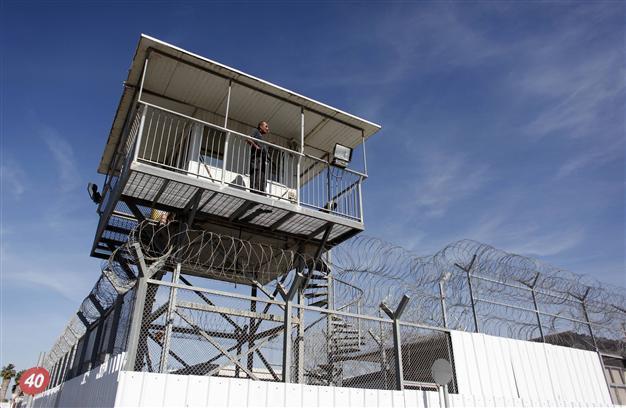Mysterious death of ‘Mossad spy’ stirs debate
JERUSALEM

Israeli prison guard keeps watch from a tower at Ayalon prison in Ramle near Tel Aviv February 13, 2013. REUTERS Photo
The mysterious death of an Australian prisoner in Israel has put the spotlight on a military-run censorship system that is finding it harder to black out secret information often only a mouse click away on the Internet.
The case involves a man reported by Australia’s ABC channel on Feb. 12 to have been a member of Israel’s Mossad spy agency. According to the report, he committed suicide in prison in 2010 in an isolated top-security wing originally built for the assassin of Prime Minister Yitzhak Rabin.
Why the man, identified by ABC as Ben Zygier, an immigrant to Israel, was jailed is still a closely guarded secret, and reports dealing with matters of state security must be submitted to military censors for vetting.
In a highly unusual move within hours of the ABC broadcast, Israeli editors were summoned to an emergency meeting in Prime Minister Benjamin Netanyahu’s office and asked not to publish a story “that is very embarrassing to a certain government agency,” Israel’s daily Haaretz reported.
Israeli news outlets that had carried the report scrambled to remove it from their websites, but that only drew attention to the case. Chatter ran rampant on Twitter and Facebook, offering polyglot Israelis links to foreign news sites.
For decades, journalists in Israel have been required to sign an undertaking to abide by military censorship rules when they apply for accreditation from the government press office. Reporters risk being denied press cards and, in the case of foreigners, work visas if they violate the regulations.
The case of “Prisoner X” was deemed so sensitive that for almost 24 hours the authorities tried to prevent any word seeping out into the local media. They finally raised the white flag after left-wing and Arab legislators used their parliamentary immunity to demand explanations about the affair on the floor of the Knesset, enabling Israeli papers to at least allude to the story.
The gag orders were eased on Feb. 12 to allow the media to carry foreign reports of the case, but the censors told journalists not to identify the dead man’s wife and two children, information that is readily available on the Internet.
s Ynet news website briefly ran a story about a prisoner being held in top secret conditions whose identity and crime was not even known to his jailers.
